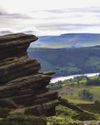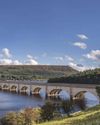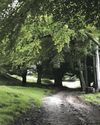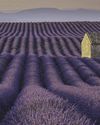OF the estimated ten species of maple which are native to Europe only one, the field maple, managed to migrate north into England before Britain became isolated from continental Europe by water.

And it left it to the last minute (metaphorically speaking), crossing when the land bridge was mostly a chalk ridge then slowly spreading on lime-rich soils as far north as Durham, Cumbria and possibly southern Scotland. Why was it late in colonising the land exposed by the receding glaciers? We all have likes and dislikes and one of field maple’s is that it likes to seed under existing vegetation. It is tolerant of shade when young, so it waited for woodland cover to be provided by other more pioneering plant species. It grows quickly initially but is usually dominated by other tree species as a forest matures, so it would probably mostly have been found on the margins of the wildwood.
The name ‘maple’ derives from the c.1300 Old English mapultreow. The trees generic name, Acer, was both the Latin noun for a maple tree and an adjective meaning sharp or pointed, reflecting the fact that the wood can be shaved to a sharp point. The specific name, campestre, means of the fields, which reminds us that the tree is more light demanding as it grows older so is more likely to be found growing in open ground rather than in woodland.
This story is from the May 2017 edition of Derbyshire Life.
Start your 7-day Magzter GOLD free trial to access thousands of curated premium stories, and 9,000+ magazines and newspapers.
Already a subscriber ? Sign In
This story is from the May 2017 edition of Derbyshire Life.
Start your 7-day Magzter GOLD free trial to access thousands of curated premium stories, and 9,000+ magazines and newspapers.
Already a subscriber? Sign In

Can Plants Hear?
In the latest in his series on the intelligence of plants, Martyn Baguley analyses whether they have the ability to hear

Peak National Park and Ride
Andrew Griffihs asks what the future holds for transport in the Peak National Park and talks to Julian Glover about his Landscapes Review

Doubly thankful
Mike Smith explores the village of Bradbourne, which has a particularly poignant tale to tell

What lies beneath
Exploring the hidden depths of Ladybower Reservoir, which conceals secrets of a fascinating past

Battle for our birds
Paul Hobson analyses our complex relationship with birds of prey and how these fascinating birds are fairing in Derbyshire

Explore the Peak Forest
A walk through autumn fields and forests with far reaching views enriched by snippets of mystery, romance and the area’s industrial past

Pictures to transport you
Chesterfield photographer David Keep continues his photographic journey, this time recalling his favourite landscape images from around the world

The magic of Christmas
Ideas for days out, gifts and where to find local produce in Derbyshire this festive season

PENNY for the Guy
We take a look at Derbyshire’s bonfire tradtions through history

From hardship came happiness
Pat Ashworth speaks with Chesterfield based retired Colonel John Doody about his inspiring life, from a diffiult childhood to overcoming diversity and finding happiness